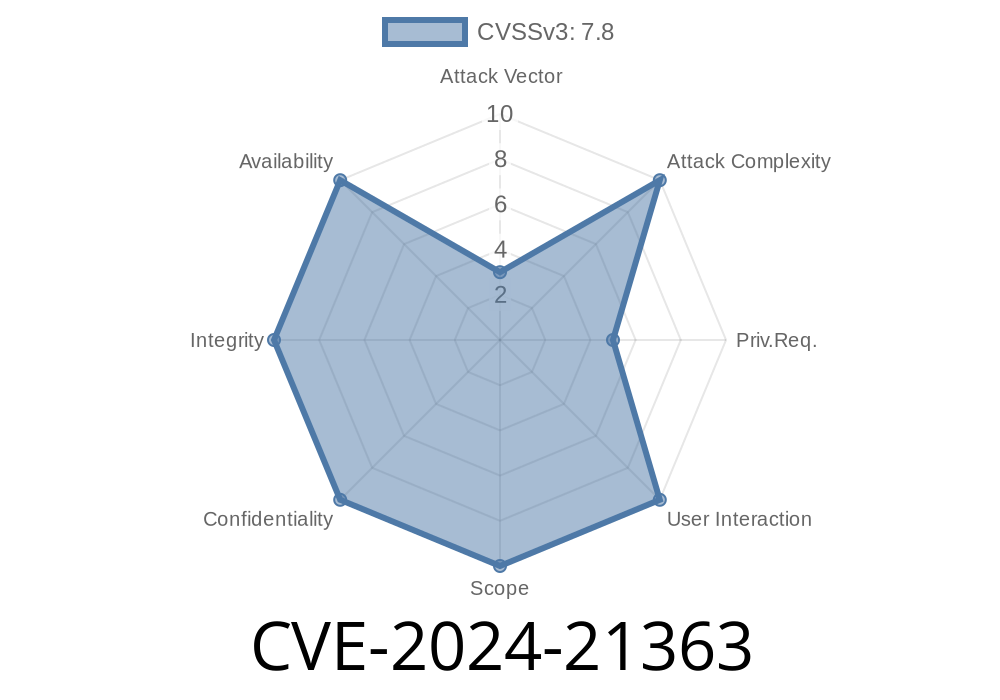---
Introduction
In February 2024, Microsoft patched a critical vulnerability—CVE-2024-21363—in its popular Message Queuing service (MSMQ). This bug allows attackers to execute arbitrary code remotely on unpatched, exposed servers. If you use MSMQ or maintain any Microsoft Windows infrastructure, understanding this vulnerability is essential for keeping your systems safe.
This article covers what CVE-2024-21363 is, its impact, exploitation details, code snippets, and how you can secure your environment. We’ll also point you to official advisories and trusted sources.
What is MSMQ?
Before diving into the bug, let’s clarify what MSMQ is. Microsoft Message Queuing (MSMQ) is a Windows component for sending messages (data) between applications reliably, even if the recipient app is offline at the moment. It's often used for enterprise apps, financial transactions, and distributed systems.
What is CVE-2024-21363?
CVE-2024-21363 is a Remote Code Execution (RCE) vulnerability in MSMQ. It enables unauthenticated attackers to run arbitrary code on a vulnerable Windows machine—just by sending a specially crafted MSMQ packet.
Here’s how Microsoft describes it in their advisory
> "A remote code execution vulnerability exists in Microsoft Message Queuing when it fails to properly handle malicious MSMQ packets sent to a listening service."
>
> — Microsoft Security Update Guide – CVE-2024-21363
Who is at Risk?
Any Windows server or workstation with MSMQ enabled and network-accessible is at risk. Typical impacted systems include:
Some Windows desktops (if MSMQ is enabled)
- Embedded/IoT devices with custom MSMQ implementations
Critical note: If your firewall exposes MSMQ ports (by default, TCP port 1801), attackers may exploit this without authentication.
Attack Vector: Remote, no authentication needed
- Potential Impact: Full compromise (attacker can run any code, install malware/ransomware, steal data, escalate privileges)
Technical Details
The vulnerability is triggered via sending a malformed MSMQ packet to the target's MSMQ service (usually listening on port 1801). This malformed packet exploits a flaw in how MSMQ parses network requests, resulting in a classic buffer overflow.
Arbitrary code executes with the privileges of the MSMQ service (typically SYSTEM).
This flaw is "wormable," meaning malware could automatically spread via open MSMQ ports.
Exploit Example (Educational Purposes Only)
Here's a Python code snippet showing how an attacker might probe MSMQ and potentially crash or exploit it. (NOTE: Do not run this on any system you don’t own!)
import socket
TARGET_IP = '192.168.1.100' # Change to target's IP
MSMQ_PORT = 1801
# This is NOT the real exploit payload, but a benign probe
# Real payload would contain carefully crafted binary data
malformed_packet = b'A' * 4096 # Overlong packet triggers buffer overflow
with socket.socket(socket.AF_INET, socket.SOCK_STREAM) as s:
s.connect((TARGET_IP, MSMQ_PORT))
s.sendall(malformed_packet)
print("Packet sent!")
For a full exploit, attackers reverse-engineer MSMQ's parsing logic, crafting data to overwrite the instruction pointer (RIP/EIP), point it to a shellcode, and gain remote code execution.
Detailed low-level PoCs may appear on security research boards after the patch but are omitted here for safety and ethics.
You can also use Nmap
nmap -p 1801 <target IP>
Install Microsoft’s official patch:
See the February 2024 Patch Tuesday for your OS version.
`cmd
netsh advfirewall firewall add rule name="Block MSMQ" dir=in action=block protocol=TCP localport=1801
References
- Microsoft Security Update Guide – CVE-2024-21363
- NIST National Vulnerability Database (NVD) - CVE-2024-21363
- Patch Tuesday, February 2024, Explained
- MSMQ Security Best Practices
Conclusion
Don’t let your network be the next headline. CVE-2024-21363 is a real and present danger for any business running unpatched MSMQ. Remediate promptly, monitor your services, and stay on top of security advisories.
Timeline
Published on: 02/13/2024 18:15:53 UTC
Last modified on: 02/13/2024 18:22:53 UTC
